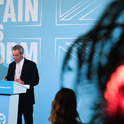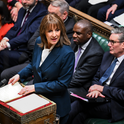A Conservative victory seems as certain as anything ever is in politics. So what can we expect from Theresa May in the next five years? Defining a May ideology or what “Mayism” is has proved difficult. But many commentators have missed the obvious. As the prime minister told the Times in November, “I am a practising member of the Church of England and so forth, that lies behind what I do.”
As is well known, May grew up in provincial southern England, the only child of a vicar, and remains a strong practising Anglican. The Church of England’s teachings are those of moderate social conservatism. Left-wing clerics like Giles Fraser may have a high public profile, but the ranks of bishops in the House of Lords and the clergy in parishes across suburban and rural England are much more cautious and traditional.
At the same time, the Church is nothing if not adaptable. It has slowly come to terms with gay rights, for example. Similarly, May voted against extensions of gay rights at the start of her parliamentary career, but now there is not a whiff of homophobia in her administration. However, while the Anglican elites of bishops and professors may be strongly pro-European, the bulk of Daily Telegraph-reading CoE church-goers never liked European institutions, lightly entertaining the conspiracy theory that it was all a Catholic, continental plot. Though a tepid Remainer during the referendum campaign, May has fully embraced hard Brexit.
Let’s describe her philosophy as “Rectory Toryism.” Many of those looking to understand the prime minister have focused on the 1950s of her early childhood or the 1970s, in which she was a young adult and student. But the turbulent 1960s, her school years, may be the most useful decade of reference. That is because the emerging Rectory Toryism looks like a return to the 1960s, when state control of society and economy was at its apogee.
When the Tory manifesto announces “For too many people, where you end up in life is still determined by where you were born and to whom" and states that the party does "not believe in untrammelled free markets” nor “selfish individualism," it is the voice of the Methodist Harold Wilson speaking and what might have been heard from a hundred church pulpits in the 1960s.
May’s plan for a cap on energy bills is in effect a nationalisation of energy prices. Her promise to launch a social housebuilding programme is straight out of the 1960s. If full Brexit happens, we shall see a massive nationalisation of core areas such as immigration and trade, the latter harking back to the glory days of the Board of Trade. Both will require mass hiring of state bureaucrats. Meanwhile, Conservative proposals to give workers the right to look after their elderly and infirm relatives reflect the Anglican priority of care.
May has shown little interest in abroad. When she went to the G20 summit last year as the new prime minster, it was the first time she had ever set foot in China. Her summer holidays are spent the Swiss Alps—perhaps the region of Europe that is the least European, a sunnier version of the Lake District with higher peaks. Rectory Tories like the country of Zwingli, where everyone speaks English and what is not forbidden is compulsory. Unlike Thatcherite Anglosphere Tories, May showed no interest in American politics until compelled to cosy up to Donald Trump.
For the time being, Rectory Toryism is a one-woman show. It remains to be seen if the Conservatives as a whole come round to it. Normal politics has been on hold since Brexit, with May saying as little as possible on her future plans beyond her obsessions with immigration and leaving the single market. That, of course, being the only way of stopping Europeans from working and living in her English provinces.
But Rectory Toryism is not an adequate response to the the crisis in public finances and the growing divides within the United Kingdom following the triumph of provincial English nationalism in the Brexit plebiscite. The 2017 general election may turn out to be curiously similar to that of 1966, in which Harold Wilson obtained a large majority. Worryingly for Theresa May, his government only lasted four years and Wilson lost the next election, after becoming not the master of events, but their prisoner.
Theresa May will take us back to the 1960s
Her philosophy of “Rectory Toryism” is strangely retro—and inadequate to the challenges ahead
May 19, 2017

Prime Minister Theresa May next to her party's campaign bus ©Stefan Rousseau/PA Wire/PA Images











